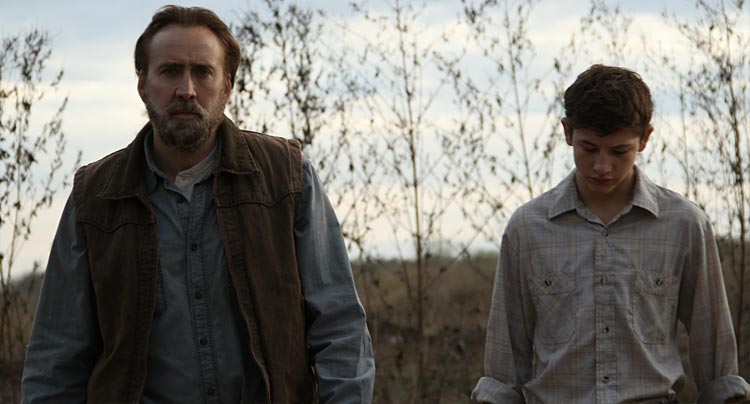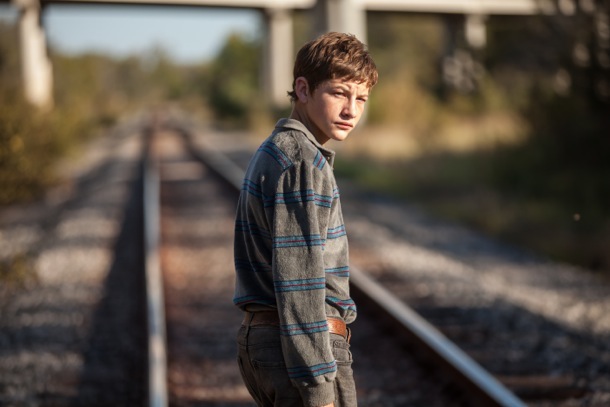Hello Joe.
The heart of the American Western has been beating most enthusiastically everywhere but in fact the West over the past decade or so. Winter’s Bone, the film that helped propel Jennifer Lawrence into stardom, exchanged dusty plains with icy forests, outlaws with methamphetamine cooks and grizzled antiheroes with a resilient young woman. Tarantino’s Django Unchained was a worship of everything Spaghetti Western, set amongst the height of slavery in the American South. David Gordon Green’s Joe owes much to the legacy of Leone and Ford, among others, although the influence is keenly hidden under the guise of a character study.
Gary (Tye Sheridan), a teenager, arrives in town eager to steer his alcoholic father, Wade (Gary Poulter) into a more productive lifestyle. Gary meets Joe (Nicholas Cage), who distinguishes the boy as a hard worker, and a friendship between the two is struck up. Gary looks up to Joe and there’s a sense that the young boy’s friendship and admiration are good for Joe’s own emotional well-being. But gradually, both of them slowly find their own personal weight being tested by their miserable environment and companionships.
There’s always been a healthy tradition of social and emotional isolation in Western protagonists, from Django (in Corbucci’s 1966 Original), to the Man With No Name to John Wayne’s iconic Ethan Edwards from The Searchers. All the central characters in Joe are lonely, for one reason or another. Gary, a fifteen-year-old boy with a good heart, is friendless as a result of being dragged from town to town by his deadbeat father, Wade. Wade himself is cut off from society, having drunk himself into a dangerous and frightening state of mind. Joe struggles to maintain a sense of decency amidst his clear and immediate inner turmoil, which boils over into violence on more than one occasion. One character reveals of Joe, “He was a good man. A good man to me anyways.” There are good men that Joe is not so kind to.
The film is about the battle between Wade and Joe for Gary’s soul, though this is never explicitly declared and probably neither man knows it. There are villains and there are heroes in Joe, but it’s not so black and white. Even Wade, an ostensibly abhorrent man capable of terrible behaviour, is not entirely unsympathetic. We’re never privy to why he became so dependent on liquor, but there’s wretchedness about the man that elicits pity rather than scorn. Joe is the hero, although not the type of hero Gary thinks he is, and Joe knows it. He is violent, and has little to no control over his rage once it overcomes him. He also has a misplaced insolence regarding the law, even when he might save himself a lot of trouble were he to comply with simple and reasonable requests.
Visually, the film strikes a chord with the Wild West of Leone. Almost every location is a neglected bar or an abandoned house or a secluded way station. One can’t but help be reminded of classic Western sets such as the train station at the beginning of Once Upon A Time In The West or the iconic cemetery at the conclusion of The Good, The Bad and The Ugly, albeit without the sense of grandeur. There are even shootouts and showdowns, although intentions and outcomes are slightly murkier than in the classic Spaghetti Westerns.
Nicholas Cage has rarely been as good and, perhaps more significantly, as understated. His best performances are nearly always the ones in which he seems to disregard his natural acting intuition. Films such as Adaptation have proved conclusively that Cage is capable of reeling his instincts in, it’s just an unfortunate rarity. The welcome surprise of Joe is that Cage’s hysterical impulses never erupt.
Disappointing then, that the finale doesn’t exploit the promise of the rest of it, settling into a fairly orthodox and largely uninteresting climax. The finale half an hour doesn’t particularly resonate emotionally, nor does it make good on the more pulpy aspects of the film. But for the most part, Joe is an engaging and well-crafted piece of cinema that is a welcome respite from the ludicrous for Nicholas Cage and an interesting, and perhaps unintentional, derivative of classically Western conventions.
8/10
For more on MIFF, click here. If you’re digging ReelGood, sign up to our mailing list for exclusive content, early reviews and chances to win big!

